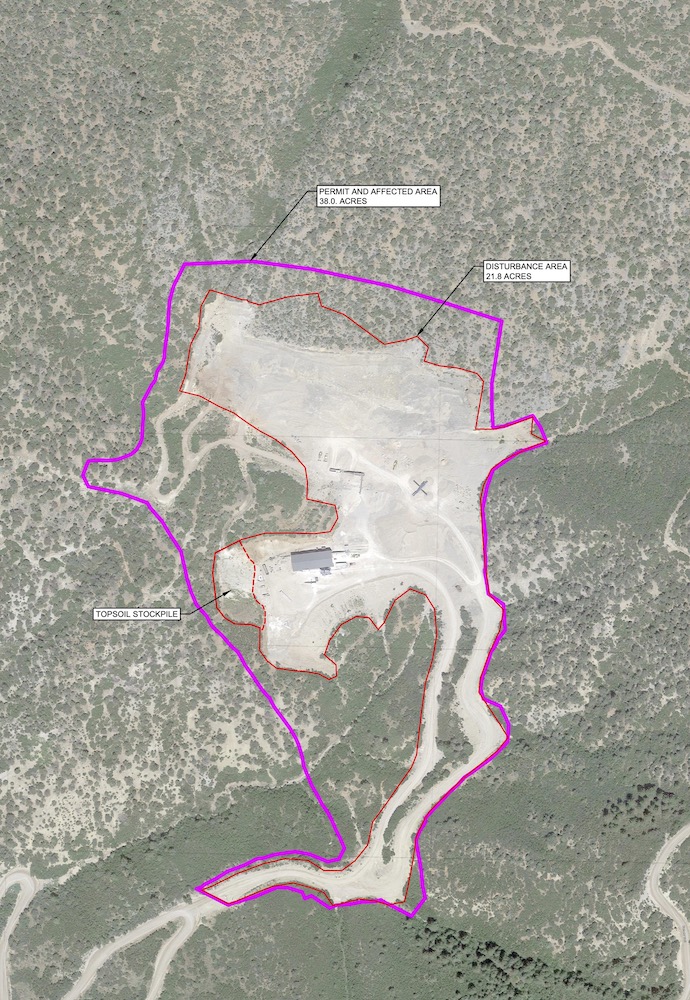DRMS gives mining company 30 days to submit a legitimate plan for quarry reclamation
Rocky Mountain Industrials failed to pull off a switcheroo when it submitted a proposal last week to the state’s mining agency seeking to expand its now-shuttered limestone quarry by 18 acres, instead of addressing its reclamation issues.
After spotting the expansion proposal on a state website, the Glenwood Springs Citizens’ Alliance sent a letter to the Colorado Division of Reclamation, Mining and Safety (DRMS) calling out multiple problems with the company’s proposal.
In a letter issued today (Feb. 7), DRMS denied outright the mining company’s Jan. 29 submittal, and gave the company 30 days to submit a legitimate proposal for site reclamation.
“The Division hereby DENIES TR-8,” states the Feb. 7 letter to Robert Wagner of RMR Aggregates Inc., a subsidiary of RMI. It is signed by Amy Yeldell, environmental protection specialist for DRMS.
“We appreciate this prompt action by DRMS to deny the expansion application filed by RMR Aggregates (RMR),” said Jeff Peterson, president of the Glenwood Springs Citizens’ Alliance. “The denial issued today was swift and strong, hitting on five key points aimed at bringing RMR into line.”

This map shows the existing 38-acre state mining permit boundary for the now-idled Rocky Mountain Industrials (RMI) limestone quarry north of Glenwood Springs. The company sought to expand the permit area by 18 acres — a nearly 50 percent increase — in a permit revision submitted on Jan. 29, 2025. On Feb. 7, 2025, the Colorado Division of Reclamation, Mining and Safety issued an outright denial of the proposal.
1. RMI’s submission on Jan. 29 was supposed to be Technical Revision No. 8, or “TR-8,” to address rock bolting as part of the quarry’s reclamation plan. The reclamation plan is being revised to address the unstable slope at the quarry remaining after the January 2023 rockslide. TR-8 was also expected to deliver cost estimates for rock bolting so the company’s reclamation bond, tentatively set at $3.2 million, could be adjusted.
“TR-8 requests a modification unrelated to the communications between DRMS and RMR related to rock bolting and the associated financial warranty,” the DRMS denial letter states.
The letter notes that RMR claimed in its TR-8 submission that “rock bolting may not be necessary long term if additional mining occurs.” DRMS countered that stance, stating, “the Division stands firm that rock bolting is the only feasible option at this time for highwall stabilization.”
2. The DRMS letter gives RMR 30 days to submit a new Technical Revision that “incorporates the use of rock bolting into the reclamation plan.” It notes that this new TR-9 “cannot modify or add affected land acreage to the permit.”
3. DRMS also makes clear, citing state mining regulations, that any attempts by RMR to expand its mining permit acreage must be done through the Permit Amendment process. It states, “Under a plain reading of the rules, TR-8’s proposal to increase the acreage of affected lands by 18.1 acres can only be done through the Amendment process.”
4. The letter also reinforces the fact that the existing quarry and RMR’s proposed expansion are on public lands governed by the U.S. Bureau of Land Management. The federal agency has its own permitting regulations, and has issued numerous permit violation citations against RMR’s now-idled quarry.
Yeldell’s letter calls out that fact. “Please note, the Division will not consider any Amendment to the (state) Mining or Reclamation Plan until the Plan of Operations with the BLM is approved and RMR can demonstrate legal right of entry for the proposed affected lands.”
5. Finally, DRMS faulted RMR for its attempt to submit its entire expansion proposal as a confidential document, keeping all details of the proposal hidden from public view.
“With regard to TR-8 being marked as confidential, entire revisions cannot be submitted under confidential cover,” the letter states. “If RMR believes that specific information should remain confidential, they must provide the Division with the proposed redactions for review and consideration. A publicly viewable document must be contained in the file.”
The Citizens’ Alliance appreciates the prompt and decisive action by Colorado DRMS to protect the Glenwood Springs community. Well done!